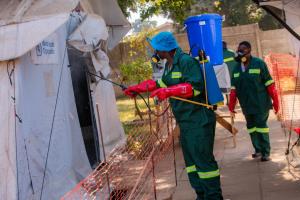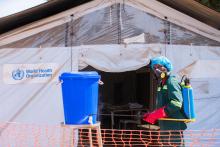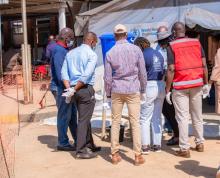WHO support decommissioning of Cholera Treatment Centres in Zimbabwe
Harare - The World Health Organization (WHO) is supporting Zimbabwe’s efforts to decommission cholera treatment centers across the country. This strategic move, funded through the Health Resilience Fund, comes after a significant decline in cholera cases, with the last reported case recorded on 30 June 2024.
The decommissioning process involves a phased approach, beginning with a training of trainers to equip healthcare workers with the necessary skills to manage the safe closure of cholera treatment centers effectively so that the materials used at the CTCs (structures, implements and waste) do not pose an infection risk to staff and the community. This training will be cascaded to provincial and district levels to ensure a coordinated and efficient process.
Zimbabwe declared the end of the cholera outbreak on July 30, marking a significant milestone in the country’s public health efforts.
WHO has played a pivotal role throughout Zimbabwe's cholera outbreak response, providing crucial support that was instrumental in managing the crisis. At the height of the outbreak, WHO and other partners facilitated the setting up of several CTCs across the country, particularly in areas with high number of cases. These centres were critical in providing specialized care to patients and controlling the spread of the disease. Oral Rehydration Points were also deployed which played a key role in managing mild cases and preventing the progression of the disease to more severe forms. These points were strategically positioned to ensure that affected populations had timely access to necessary treatment. WHO conducted extensive trainings for healthcare workers, enhancing their capacity to diagnose, treat, and manage cholera cases effectively. These trainings were crucial in building a robust response team capable of addressing the outbreak’s challenges. The organization provided essential logistical support, including the distribution of medical and non-medical supplies and coordination with local health authorities to ensure a cohesive and effective response.
As Zimbabwe transitions from emergency response to recovery, the lessons learned, and the systems strengthened during the cholera outbreak will continue to benefit the nation’s health system. WHO remains committed to supporting Zimbabwe in its efforts to maintain health security and build resilient healthcare systems.
The Health Resilience Fund is a pool of funding from European Union, GAVI, The Vaccine Alliance, as well as the Governments of Ireland and the United Kingdom.






